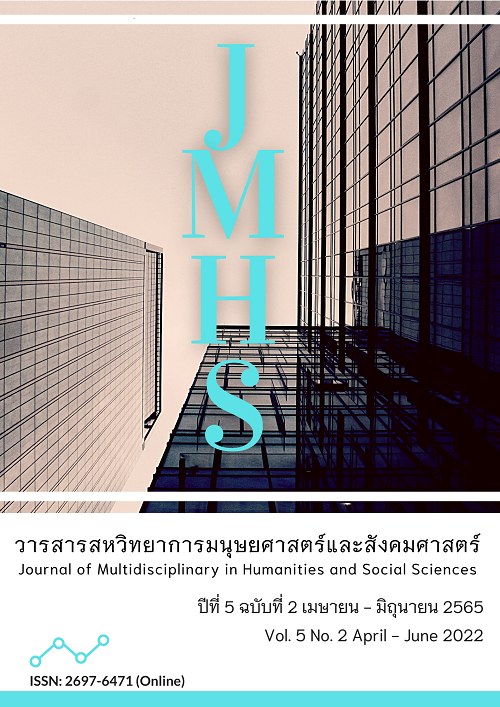A Study of Vipassana Practice in Kama Sutta
Main Article Content
Abstract
The objectives of this article were 1) to study the content and important teachings found in Kāmasutta and 2) to study the practice of Vipassana meditation in Kāmasutta. All research data has been taken from Theravada Buddhist scriptures and documents related, being summarized, analyzed, and compiled in descriptive type. The results revealed that analysis of the teachings in Kāmasutta related to Vipassana meditation practice was divided into 2 types: 1) Kilesakāma or subjective sensitivity associated with insight practice in which yogi who practice insight should avoid these 3 defilements: (1) Rāga or the desire to possess others’ properties which do not belong to one’s own, which refers to attachment classified as unwholesome defilement connected with lust, (2) Lobha or greed, referring to all unwholesome roots causing the mind to become miserable, this will advance the practice of insight, (3) Icchā or envy, which is the desire, longing, wondering, and passion for all sensual pleasures. To abandon these defilements will enhance the insight practice in progress; and 2) Vatthukāma or objective sensitivity related to insight practice reveals that a yogi who practices insight should abandon the sensual desire of visible objects, sound, smell, taste, and touch, he must be mindful of all appearances, that is, when external senses are active, realizing the true nature of all as just Nāma or name and Rūpa or objects in which arises and falls immediately, just a natural way, appearing according to various factors. Completely observed these five sensual-pleasures as they really were with consistent mindfulness, the practitioners will gain great aid in abandoning and eliminating these 5 sensual-pleasure attachments.
Article Details

This work is licensed under a Creative Commons Attribution-NonCommercial-NoDerivatives 4.0 International License.
Views and opinions appearing in the Journal it is the responsibility of the author of the article, and does not constitute the view and responsibility of the editorial team.
References
ชัยชาญ ศรีหานู. (2564). วิเคราะห์คำสอนวิปัสสนาในเตภูมิกถาที่มีผลต่อคตินิยมเชิงพุทธในสังคมไทย. วารสาร มจร บาฬีศึกษาพุทธโฆสปริทรรศน์, 7(1), 12-26.
พระพรหมคุณาภรณ์ (ป.อ. ปยุตฺโต). (2557). พุทธธรรม ฉบับปรับขยาย. (พิมพ์ครั้งที่ 40). กรุงเทพฯ: ผลิธัมม์.
พระพุทธโฆสเถระ. (2554). คัมภีร์วิสุทธิมรรค. (สมเด็จพระพุฒาจารย์ (อาจ อาสภมหาเถร), แปล). (พิมพ์ครั้งที่ 10). กรุงเทพฯ: ธนาเพรส.
พระมหาพงศ์ศิริ ปญฺญาวชิโร. (2564). วิเคราะห์ทานบารมีในคัมภีร์อรรถกถาชาดก. วารสารสหวิทยาการมนุษยศาสตร์และสังคมศาสตร์, 4(1), 63-73.
มหาจุฬาลงกรณราชวิทยาลัย. (2539). พระไตรปิฎกภาษาไทย ฉบับมหาจุฬาลงกรณราชวิทยาลัย. กรุงเทพฯ: โรงพิมพ์มหาจุฬาลงกรณราชวิทยาลัย.
มหาจุฬาลงกรณราชวิทยาลัย. (2552). อรรถกถาภาษาไทย ฉบับมหาจุฬาลงกรณราชวิทยาลัย. กรุงเทพฯ: โรงพิมพ์มหาจุฬาลงกรณราชวิทยาลัย.
ราชบัณฑิตยสถาน. (2556). พจนานุกรมฉบับราชบัณฑิตยสถาน พ.ศ. 2554. กรุงเทพฯ: ศิริวัฒนา อินเตอร์พริ้นท์.
สมเด็จพระพุทธโฆษาจารย์ (ป.อ. ปยุตโต). (2561). พจนานุกรมพุทธศาสน์ ฉบับประมวลศัพท์. (พิมพ์ครั้งที่ 31). กรุงเทพฯ: สหธรรมิก.
Damnoen, P. S., & Dhirabhaddo, P. N. (2019). The Development of Indicators of Active Aging Enhancement in Buddhist Way for the Retirement of Elderly. Journal of Graduate MCU Khonkaen Campus, 6(3), 209-228.
Damnoen, P. S., Chaiworamankul, Y., Thammawatsiri, P. A., & Soontrondhammanitus, P. (2021). Buddhist Ethics and the way of Living in Daily Life: An Analysis of Genital Malfeasances (Kāmesumicchācāra). Turkish Journal of Computer and Mathematics Education, 12(8), 2943-2948.
Kongkawai, P. S. Phrakruarunsutalangkarn, P., Damnoen, P. S., & Khamhanphon, A. (2021). Buddhist Integrated of Management for the Youth Training of Moral Camp in Nakhon Si Thammarat Province. Psychology and Education Journal, 58(1), 3724-3728.
Tan, C. C., & Damnoen, P. S. (2020). Buddhist Noble Eightfold Path Approach in the Study of Consumer and Organizational Behaviors. Journal of MCU Peace Studies, 8(1), 1–20.
Yusamran, P. P., Thitipasitthikorn, P.P., Damnoen, P. S., Thienthong, P. B., Rattana-ngam, S., & Homchan, P. (2021). Conservative and Inheritance of Atthami Bucha Day for Sustainable Promotion Tourism. Journal of Positive Psychology and Wellbeing, 5(3), 1400–1410.


